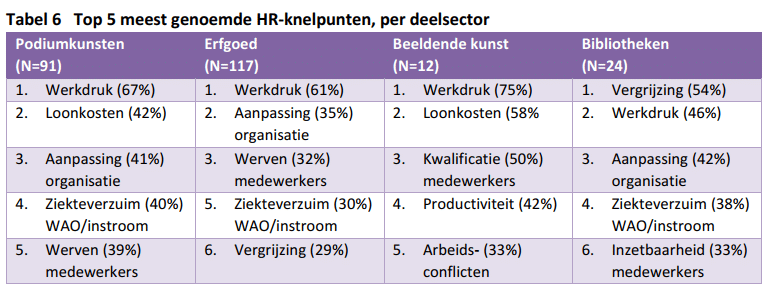'I would love to have a human resources manager on staff, but yes, quite a shame.' Dixit the director of a medium-sized arts institution. As in the rest of the Dutch SME sector, in the arts sector personnel policy, or HR policy, is something that is at most done on the side. Anyone who has ever got it wrong can tell great stories about it.
How to deal with that expense of 60% occasionally saying something back when you want to get something done in the arts as a manager? Pretty tricky. It was all investigated for the first time. On Friday 30 June, the Performing Arts Social Fund came out with A first sector-wide survey of the HR situation in the arts sector. Overall conclusion: we are all just messing around, human resources-wise. Although the overall figures do not indicate too big a difference with the rest of the SME sector in the Netherlands.
Family
Ideally, every boss would like to be friends with the staff, or rather, play family. Good example from the survey is a comment made by a business leader of a music venue: 'On my floor, someone who just works 30 hours and 'that's it' is seen as lazy. 300% is expected. While this person was actually right. He was doing an incredibly good job. But he didn't fit into that family structure. That got me thinking: I need to pay more attention to that. People are your biggest capital.'
Heart for business, don't whine and keep going until you drop dead: everyone in SMEs does that, so it's not all that special. With that, you could soon leave research where that kind of research usually ends up: the drawer. And that would be a shame. Not only of the hard work the researchers put into it, but also of the things it yielded. When reading the report, you just have to be selective then. I will explain why that is necessary in this case.
Libraries odd duck
The Culture sector is quite broad and varied. It is also not very big - especially since PVV and VVD removed 25-35 per cent of it. More troublesome is that it also includes libraries and heritage institutions (museums and archives). Especially when it comes to human-resources policy, the two are quite different from the more recognisable cultural things like performing and visual arts. The figures also show this.

In the library and heritage sector, things tend to be organised more officially. There, a spot is more often reserved for a separate HR officer, there are more permanent contracts and things like appraisals are more part of the standard package. In the performing arts, it is different. It is completely seamless in the Visual Arts sector. Not coincidentally, because the latter two sectors have also been hit hardest by the cuts.
Quite a shame
Even without budget cuts, human resources management, training, sustainable employability and HR things like that are not very popular among active artists and their often small organisations. For example, a business leader of a medium-sized theatre company explained: 'We blow ourselves up and out like a balloon, depending on the projects we do. After a merger, we had to greatly reorganise and make cuts (1 million). We had to choose how to do it: part-timers. Keeping as many people as possible but on smaller contracts. But very often you still make greater demands on those people. We ask for flexibility, when do you over-demand them? I would love to have a human resources manager on staff, but yes, a real shame.'
Another problem is that many institutions are only sure of their continued existence for two years at a time. The subsidy rounds prescribe this. try then to pursue a sustainable personnel policy. For instance, by joining the trend that more people have to be salaried. So says a business leader of an orchestra: 'I now see a bottleneck coming in terms of working with freelancers and the disappearance of the VAR. You have to hire people faster, for example a producer, educator or workshop leader. And then you get into a mess with those 2 years. They do not ultimately form the basis of your business operations.'
Job rotation
Of course, it is not all doom and gloom. Working in the arts is mostly fun. But that's also a pressure: you're out quickly if you don't like it and don't put in three hundred per cent effort. And then you can also get out badly. So sometimes people feel trapped in their fantastic job. Looking around is difficult in small clubs where everyone already has a specialisation. There are solutions to this, the survey suggests: 'Rotation is not possible in every organisation. But I would advocate for the sector to have a job rotation system.'
But the art world would not be the art world if unorthodox solutions were also considered: 'Employing people jointly. The three of us employ someone jointly and lend to each other. We tend to stick to the law, live by the letter of the law and so this leads to more people being employed on a permanent basis anyway.'
Trappers
The most fun solution for the office? Cycling. Especially for libraries, it can help bring some dynamism to the organisation: 'We have about 40 people in the office and they sit all day. I want to introduce the cycling desk. Now found cause with employee with weak back. He got a bicycle desk and everyone is very enthusiastic. The setting in the office is also a focus.'
Do you have your own great solutions for better human resources management? Share them in the comments!
